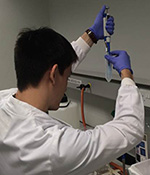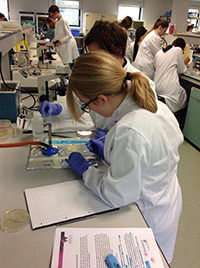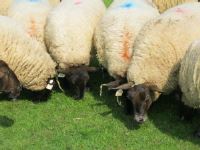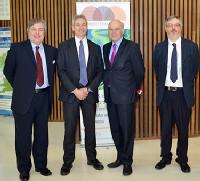Departmental news
Plants remember stress to help protect themselves
A new generation of plants better adapted to mitigate the effects of environmental change could be created following a fundamental step towards understanding how plants are able to retain a memory of stress exposure.
The research, led by Dr Jose Gutierrez-Marcos and published in the journal eLife, provides the first compelling evidence that plants have evolved ways to remember previous exposures to stress, in this case high salinity conditions, which can help subsequent progenies withstand the same stress in future.
Warwick students to present at MIT in international synthetic biology competition
 Undergraduate and newly graduated students from Warwick University will be travelling to MIT, Boston, this September 24-28 to compete in a global synthetic biology competition.
Undergraduate and newly graduated students from Warwick University will be travelling to MIT, Boston, this September 24-28 to compete in a global synthetic biology competition.
The team is interdisciplinary, with students from distinct academic fields bringing different skills and expertise to the table. These departments involve Maths, Physics, Engineering and Life Sciences, with Biomedical, Biochemical and Biological Sciences represented.
The team will be supported with advice from academic and research staff, including Prof Alfonso Jaramillo and Prof John McCarthy, among others, at the School of Life Sciences.
Warwick welcomes the next generation of scientists
 This week the School of Life Sciences welcomes the next generation of scientists from across the United Kingdom as part of a Headstart Summer School.
This week the School of Life Sciences welcomes the next generation of scientists from across the United Kingdom as part of a Headstart Summer School.
Taking place between the 19-23 July at the University’s Gibbet Hill campus, the Headstart Life Sciences course will provided the 17 year olds the opportunity to explore different biological disciplines taught within the School of Life Sciences and introduce them to a flavour of the academic side of undergraduate life.
Researchers have been awarded over £1.3m to research food security
Researchers from the University of Warwick’s School of Life Sciences (SLS) have been awarded over £1.36m in grants to further their work into food security.
The BBSRC Horticulture and Potato Initiative (HAPI) grants include substantial cash and in-kind contributions from industrial partners and will be used to support work into how to improve pest and disease control and post-harvest quality.
Commenting on the grants Professor Laura Green, Head of SLS, said:
“The BBSRC HAPI grants will help ensure that the University of Warwick’s School Life Sciences continues to play a leading role in improving food production globally. The Warwick HAPI-funded projects will result in substantial impacts on the horticulture industry by translating research findings into solutions that benefit several stages in the food supply chain, including farmers, processors and retailers.”
Researchers secure £3.19m boost to tackle superbugs
Life Sciences researchers have been awarded £3.19m in funding to support a flagship project into antimicrobial resistance (AMR).
The funding will enable multi-partner collaborations in order to tackle the growing threat of superbugs as part of a co-ordinated multi-disciplinary effort to fight their prevalence.
Awarded by a cross research council ‘war cabinet’ on AMR comprising the Medical Research Council (MRC) and the Biological Sciences Research Council (BBSRC), the funding marks one of the largest UK public grant investments in AMR research.
Researchers Prof Chris Dowson, Dr David Roper, Dr Adrian Lloyd from the School of Life Sciences and Prof Matthew Turner of the Department of Physics, will investigate a vital link in the chain of antimicrobial resistance – the bacterial cell wall. The main component of the wall is called peptidoglycan, which is the key target of penicillin and other similar antibiotics.
BBSRC award £601,861 to study Footrot in sheep

Professor Laura Green and Dr Kevin Purdy from the School of Life Sciences and Professor Matthew Keeling from the School of Life Sciences and the Mathematics Institute, at the University of Warwick have been awarded £601,861 to study the issue of Footrot in sheep.
The Biotechnology and Biological Sciences Research Council's (BBSRC) Animal Health Research Club (ARC) announced the award on Friday 27th March 2015 as part of a range of new research projects to improve the health of livestock.
Professor Laura Green, Head of the School of Life Sciences at the University of Warwick said:
“Footrot is very common in sheep in the UK, affecting more than 95% of sheep flocks. Footrot is caused by Dichelobacter nodosus, a bacterium that causes inflammation of the skin of the foot which leads to lameness. Using swab samples collected from the feet of sheep kept under different managements, the study will determine which molecular factors in Dichelobacter nodosus and which managements in sheep are most important in disease progression and how these lead to disease spread and persistence, informing on potential approaches to improve flock resilience to the disease."
Dr Celia Caulcott, BBSRC Executive Director, Innovation and Skills, said:
"By targeting these livestock diseases the Animal Health Research Club projects have the potential to protect farmed animals and food supplies and save UK farmers and the wider economy millions of pounds a year.”
“The Club shows that the public sector and private industry can work together to fund and support excellent research tackling important research challenges.”
Press release
New £12 million Synthetic Biology Centre to help drive advances in biotechnology, medicine and food security
 Researchers at the Warwick Integrative Synthetic Biology Centre (WISB), University of Warwick, that brings together disciplines including Life Sciences, Engineering, Chemistry, Computer Science, Education, and Law, have won a £12 Million award to create a new Centre to develop advanced technologies in synthetic biology.
Researchers at the Warwick Integrative Synthetic Biology Centre (WISB), University of Warwick, that brings together disciplines including Life Sciences, Engineering, Chemistry, Computer Science, Education, and Law, have won a £12 Million award to create a new Centre to develop advanced technologies in synthetic biology.
Vince Cable, the Secretary of State for Business, Innovation and Skills announced the new Centre as part of a £40M investment in UK synthetic biology, at the Manchester Institute for Biotechnology on Thursday 29th January.
Professor John McCarthy, Director of WISB and from the School of Life Sciences (pictured above with Vince Cable), said:
" We are delighted to receive this strategically important UK Synthetic Biology Centre Award. Synthetic biology has huge potential to generate valuable processes and products for biotechnology and medicine, as well as new understanding of the fundamental principles that underpin living systems. WISB is building a globally recognized presence as a centre of excellence in research and training in Synthetic Biology, and this grant from BBSRC and EPSRC will help us enormously in achieving our goals.”
Prof. David Evans - Possible that a successful GSK Ebola vaccine might help in this outbreak due to underestimating the number of cases
Following the announcement of GlaxoSmithKline (GSK) that a, currently under development, Ebola vaccine may not be ready for the current outbreak, Professor David Evans of the University of Warwick's Department of Life Sciences argues that it is "still possible that a successful GSK Ebola vaccine might help in this outbreak" due to the World Health Organisation (WHO) prediction that - by Christmas - new cases could number 10,000 per week.
Focus on naturally occurring protein to tackle dementia
Researchers led by Dr Sonia Correa have provided the first evidence that the lack of a naturally occurring protein is linked to early signs of dementia.
Published in Nature Communications, the research found that the absence of the protein MK2/3 promotes structural and physiological changes to cells in the nervous system. These changes were shown to have a significant correlation with early signs of dementia, including restricted learning and memory formation capabilities.
First national model for Bovine TB calls for more focus on cattle
In a study published in Nature this week, Professor Matt Keeling and fellow researchers have produced the first national model to investigate the bovine TB spread.
The results derived from the model in the Nature paper, entitled “A dynamic model of bovine tuberculosis spread and control in Great Britain”, demonstrated that the majority of herd outbreaks are caused by multiple transmissions routes - including failed cattle infection tests, cattle movement and reinfection from environmental reservoirs (infected pastures and wildlife). The study suggests that improved testing, vaccination of cattle and culling all cattle on infected farms would be the most effective strategies for controlling the disease.

